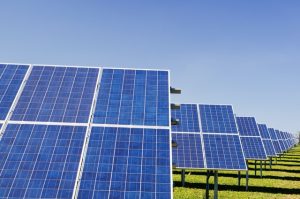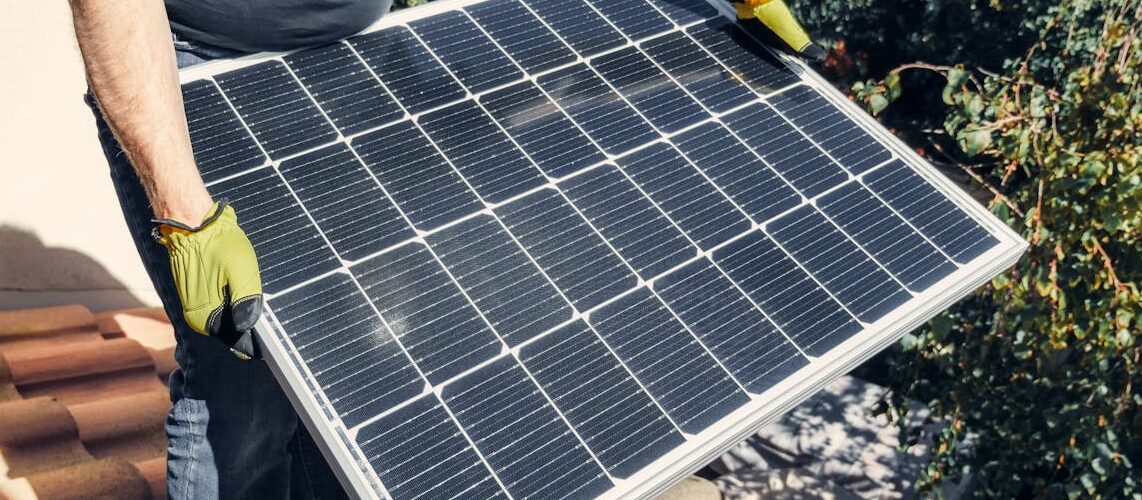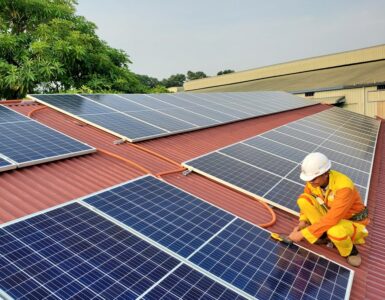The power of the Sun, revered in many cultures for its role in shaping humanity, is unfortunately not harnessed to its full potential as a clean energy source.
According to the US Department of Energy, “The amount of sunlight that strikes the earth’s surface in an hour and a half is enough to handle the entire world’s energy consumption for a full year.”

To generate energy from the Sun, we need solar panels installed in any open location that receives maximum sunlight, like a rooftop, garage shade, boundary walls, above-water tanks, etc.
When sunlight hits solar panels it releases electrons. Solar panels are made of semiconductor materials which help in the flow of these electrons creating an electric current.
Unlike traditional fossil fuel energy sources which release heat-trapping greenhouse gases, solar energy is clean and renewable.
In addition, to harness this power of the sun you don’t have to rely on large companies or government institutions, you can easily do it at the place that you own.
Moreover, solar technology has drastically improved, with highly efficient solar panels and their components available at competitive prices.
So whether you are an individual or a business, let us explore the advantages and drawbacks of solar energy systems to help in your sustainable journey.
Advantages of Solar Energy System
Let us first understand the benefits of solar panels.
Money Saving
With the rapid decline in the costs of solar panels, installing them at your home is not only affordable but also helps cut down your monthly expenses. The amount of savings depends on your current power usage versus the solar system installed and the power it can generate.
In case your rooftop solar installation can generate more power than you use, this can be sold to the utility company, which means additional income. To avail of this benefit your solar panel system should connected to the grid (power utility company).
Lower your Carbon Footprint
Another benefit of solar panels at home is a personal sense of achievement of using a clean energy source. Most electricity production is powered by fossil fuel, which contributes to your carbon footprint. In fact, in some cases, electricity consumption is the biggest contributor to the household carbon footprint.
Carbon footprint is a measure of greenhouse gases released into the environment due to your actions like travel & transportation, food consumption, lifestyle activities, and household energy.
Solar energy is a clean energy source that does not produce carbon emissions or other greenhouse gases and helps mitigate climate change.
Installing solar panels would not only help your green transition, but it is also a small contribution to humanity and future generations. It will give you some bragging rights in front of your friends and family.
Take Advantage of Subisdies and Tax Incentives
Many government and civic authorities worldwide provide subsidies and other benefits like tax incentives to encourage rooftop solar installations.
These incentives help reduce the load on the state’s energy resources and also help in their transition to net-zero goals.
Reduce Dependence on State Power Supply
The benefits of solar panels at home also include your independence from power supply companies and power cuts.
With solar systems working in your home, you don’t have to rely on power companies. Thus in case of any power failures in your area or during an emergency, the solar panels in your home will keep the lights on.
The independence from the electric grid is conditional on whether you have an energy storage system.
Increase your House Resale Value
A house equipped with solar panels also helps to increase the home’s resale value.
If you ever plan to sell your house for whatever reason, the prospective buyer will be willing to pay an extra premium as they will know that they can save on their future energy bills.
Low maintenance
Solar systems which comprise solar panels, investors, and a battery pack require low maintenance.
You need to ensure that the solar panels are kept clean and in good physical condition to keep them working properly for 20-25 years. Depending on the usage, the inverter and cables might require repairs or replacement.
Promote Green Jobs
As we know traditional fossil-based energy employs millions of people who are working in the challenging coal-mining sector. By transitioning to the solar system, you are supporting green jobs, which are safer.
Drawbacks of Solar Energy Systems
To make it a fair discussion, let us also understand some of the challenges that the solar system presents and how you can mitigate them.
Initial Costs of Solar Panels
Despite solar panels becoming cheap over the years, you still need to pay high upfront costs to purchase and install solar systems at your home or business.
Fortunately, as mentioned in the benefits of solar panels, many government provides incentives and subsidies to make your purchase. Moreover, there are financial institutions that provide loans at low interest rates which also help in reducing your financial burden.
To make your decision, you can do a cost-benefit analysis where you analyze the monthly savings on power bills with the initial setup costs.
Installation Challenges
If you are not an expert, installing solar panels would require professional assistance.
These experts will analyze the space available, the sun’s direction, and other things to suggest the best solar system for your home or business. The installation also would need some civil engineering and electrical work to make the solar system complete.
Occupy Space
If you want to install solar panels in your home or business, you require a large open space like a rooftop. Then based on your energy requirements, solar panels will be installed in that open space, which might restrict your other activities.
If you are short on space you can install solar panels on an elevated frame which will allow you to use the space below.
Dependence on Sunlight
We don’t have to say this, but you should install solar panels only when your place receives adequate sunlight. If you don’t have an open place that receives sunlight or stay in a region that is always cloudy, the effectiveness of solar panels will be low.
Solar Energy Storage
As mentioned in the benefits of solar panels section, they give you independence from the electric grid supplies. However, this freedom is conditional on whether you install a battery.
Solar systems can be used without batteries if you are connected to the grid. Your solar system will work when the sun is out and switch to the grid system in the nighttime.
If you want complete freedom from the grid, you need to install batteries for storing the energy. The batteries will store the sun’s energy which can be used at night or on cloudy days. Having batteries will add to your initial cost and would also require maintenance.
Other Environmental Impacts
Solar panels can easily serve you for more than two decades, but what happens after its life, because currently the recycling options for solar panels remain limited.
Further, solar energy systems comprising solar panels, investors, batteries, wire, and other electrical parts require materials, such as metals, and glass, that are energy-intensive to manufacture, store, and transport.
Wrapping Up
Finally, we can say that the benefits of solar panels outweigh the drawbacks, considering that we have adequate mitigation strategies and constant advancements happening in the sector. However, the decision lies with you.






Add comment